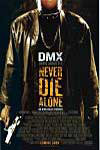Never Die Alone (R) ★★★½
 Far from your typical MTV-style production, Never Die Alone is a gritty and introspective thriller about karma told by a dead man who learned too late that what comes around inevitably goes around.
Far from your typical MTV-style production, Never Die Alone is a gritty and introspective thriller about karma told by a dead man who learned too late that what comes around inevitably goes around.
Story
King David (DMX) was a New York City drug dealer who burned his bridges with his supplier, Moon (Clifton Powell), and left for Los Angeles to start a drug trafficking business of his own. Now, 10 years later, King decides it's time to right some wrongs from his past. He returns to NYC and calls up Moon offering to pay off his outstanding debt with interest if Moon would call off any hits on his life. Moon agrees, but one of his runners, Mike (Michael Ealy), won't let the vendetta go and stabs King on the street. Paul (David Arquette), an aspiring journalist, witnesses the crime and rushes to the hospital to help King, who signs everything he owns--his car--over to the reporter as he lay dying. Paul rummages through the car and finds a hollowed-out Bible containing several audiotapes on which King had recorded his life story. Via these tapes, we are taken back in time to King's life on the West Coast and the reasons why he left New York in the first place, and it is pretty disturbing stuff. Paul discovers that King was a twisted and violent individual who destroyed the lives of the women he claimed to love as well as the son he never acknowledged. But ultimately, King had come back to make amends in a plan that went tragically awry.
Acting
Never Die Alone is DMX's movie and it's obvious that the rapper/actor really took time to craft this character. King is a heartless individual, someone who is way too slick to be trusted, but DMX creates a character that is still impossible to hate. Co-star Ealy said it perfectly when describing King: ''He's one of the most wretched characters I've ever read for the screen, and somehow DMX gives him some sort of charm, which is sick.'' Maybe it's the fact that that King is trying to redeem himself and his ugly deeds, or the fact that he got burned by the only woman he allowed himself to love. Whatever the reason, King's duality makes him a fascinating character and one perfectly personified through DMX's impeccable performance. As Paul, Arquette is both believable and appropriately subtler than DMX. Because Paul spends most of his screen time listening to the tapes, his role is to react to what he is hearing and at times witnessing. But although Paul's is a spectator role, he also shows an unassuming depth. The only white character in the film, Paul is a struggling writer who uses an old-fashioned typewriter, so fascinated with black American culture he chooses to live in a rough neighborhood to absorb everything he can.
Direction
Director Ernest Dickerson (Juice, Bones) served as director of photography on several Spike Lee films, including Do the Right Thing and Malcolm X, and his style reflects that. Visually, Never Die Alone is high-contrast and grainy, with some scenes shot in dim obscurity while others are intensely lit. Dickerson also distinguishes flashbacks within flashbacks with bluish black-and-white shots. It's a thoroughly modern-day pic that has a vintage '70s feel to it, which is fitting considering the source. Never Die Alone is based on a 1974 novel by the late black American cult writer Donald Goines, who was shot to death that same year. A drug-addicted pimp and gambler, Goines wrote many of his 15 bestsellers while incarcerated, giving his work disturbing authenticity. This film was adapted for the big screen by scribe James Gibson, who added some modern touches, such as King recording his memoirs rather than writing, without taking away Goines' pulp-style storytelling. Shot in just 18 days, Dickerson's Goth-like vision of this troubling tale about the dark side of human nature encapsulates the film noir genre.
Bottom Line
Never Die Alone is not the slick, MTV-style production usually associated with flicks starring rappers, but a surprisingly raw and introspective thriller about the brutal and sadistic sides of humanity.
To get the full Quicklook Films experience, uncheck "Enable on this Site" from Adblock Plus
box office top 10

Challengers Released: April 26, 2024 Cast: Zendaya, Josh O'Connor 15M

Unsung Hero Released: April 26, 2024 Cast: Daisy Betts, Joel Smallbone 7.8M

Godzilla x Kong: The New Empire Released: March 29, 2024 Cast: Rebecca Hall, Brian Tyree Henry 7.2M

Civil War Released: April 12, 2024 Cast: Kirsten Dunst, Wagner Moura 7M

Abigail Released: April 19, 2024 Cast: Melissa Barrera, Dan Stevens 5.3M

The Ministry of Ungentlemanly Warfare Released: April 19, 2024 Cast: Henry Cavill, Eiza Gonzalez 3.9M

Kung Fu Panda 4 Released: March 8, 2024 Cast: Jack Black, Viola Davis 3.6M

Ghostbusters: Frozen Empire Released: March 22, 2024 Cast: Paul Rudd, Carrie Coon 3.3M

Dune: Part Two Released: March 1, 2024 Cast: Timothée Chalamet, Rebecca Ferguson 2M

Boy Kills World Released: April 26, 2024 Cast: Bill Skarsgård, Famke Janssen 1.7M






